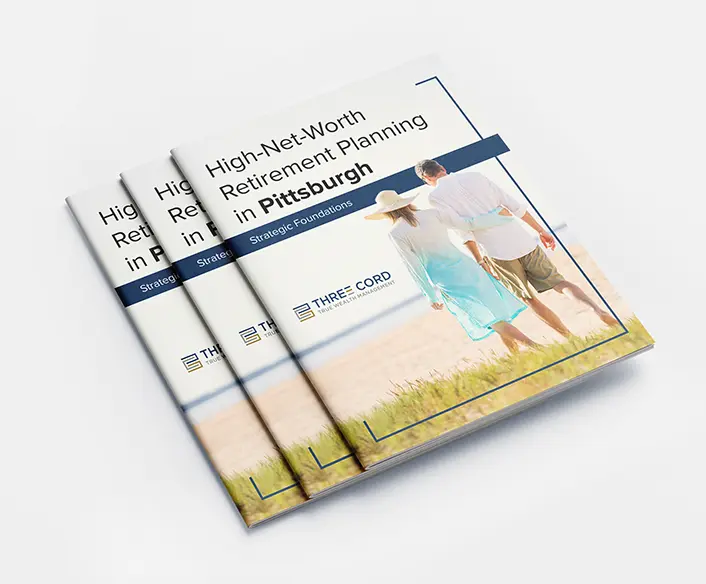Managing a 401(k) internally often creates unnecessary pressure:

We tailor your plan to align with company goals, workforce demographics, and competitive positioning—making benefits a true differentiator.

Our team handles investment selection, fee benchmarking, and regulatory testing, helping you meet fiduciary obligations with confidence.

We equip your employees with clear education, online tools, and one-on-one support so they can maximize their retirement benefits—improving satisfaction and retention.
Working with Vasili, Nick, and the Three Cord team has really taken a lot of stress off my shoulders, and I’d strongly recommend their services to anyone looking to improve their financial well-being. Incredibly consultative, personalized, and straightforward – no jargon; just practical and compassionate expertise to help you reach your goals. These guys are the real deal!
I’ve had the pleasure of working with my advisor, Vasili, at Three Cord Wealth Management, and the experience has been nothing short of exceptional. Beyond simply managing our investments, Vasili takes the time to truly understand what matters most to me and my family. Together, we mapped out a clear and realistic plan to fund my children’s future education. He’s also guided me through various life insurance options, always diving deep into the details to ensure he has full conviction in his recommendations. That level of thoroughness and integrity really stands out. What I appreciate most is how proactive he is. From scenario planning around retirement to exploring how potential business ventures could impact my long-term financial picture, Vasili doesn’t just react—he anticipates.
I have had the privilege of working with the team that has become Three Cord Wealth Management for nearly 25 years, and I can say with confidence that their guidance and expertise have been excellent in helping me navigate every phase of my finances. From early planning and investment strategy, through market highs and lows, during retirement preparation and estate planning, they have consistently delivered expert advice and followed through with their commitment to my long-term success. I wholeheartedly recommend Three Cord.
“How Pittsburgh’s Most Successful Individuals and Families Find the Right Financial Advisor”
Discover how Pittsburgh’s most successful families choose the right financial advisor—and what to look for if you have $1M+ in assets or $350K+ in income.

Retirement planning in Pittsburgh transcends basic income projections; it involves the deliberate construction of a financial framework that reflects personal values, lifestyle aspirations, and multi-generational wealth objectives. For high-net-worth households, this means leveraging jurisdiction-specific tax benefits—such as Pennsylvania’s exemption on most retirement income (Pennsylvania Department of Revenue, 2024)—while addressing both market volatility and personal life changes.
Through a comprehensive planning approach—combining income optimization, risk governance, and portfolio alignment—affluent individuals can secure not only financial stability but also enduring impact for their families and communities.
An effective retirement strategy begins with structural clarity:
A precise baseline assessment provides the analytical foundation for long-term planning:
Designing retirement goals requires anchoring projections to Pittsburgh’s regional cost dynamics, which remain moderate compared to national urban averages but are subject to sector-specific inflation, particularly in healthcare and property taxes (U.S. Bureau of Economic Analysis, 2024).
Key considerations include:
Advisor selection is a determinant of plan quality and should be approached with the same due diligence applied to selecting an institutional asset manager. In the Pittsburgh market, advisors range from boutique fiduciary practices to large-scale LLCs, each offering different levels of personalization, investment access, and fee structures (FINRA, 2023).
Evaluation criteria include:
Advisor selection is a determinant of plan quality and should be approached with the same due diligence applied to selecting an institutional asset manager. In the Pittsburgh market, advisors range from boutique fiduciary practices to large-scale LLCs, each offering different levels of personalization, investment access, and fee structures (FINRA, 2023).
Evaluation criteria include:
The first meeting with a retirement planner should function as a mutual assessment, allowing the client to confirm technical fit and philosophical alignment. Arrive prepared with:
By formalizing this dialogue, you create a framework for accountability and ensure that the advisor’s methodology aligns with both local jurisdictional nuances and global market realities.
For high-net-worth retirees, capital preservation is not merely defensive—it is an active discipline requiring integration of diversification, tax engineering, and asset protection measures. In Pittsburgh, these strategies are shaped by Pennsylvania’s favorable retirement income tax treatment (Pennsylvania Department of Revenue, 2024) and the region’s sector-specific investment opportunities in healthcare, technology, and infrastructure (Allegheny Conference on Community Development, 2024).
Advisors may employ risk-budgeting frameworks—allocating risk capacity rather than simply asset percentages—to better align with a client’s volatility tolerance and consumption needs (CFA Institute, 2023).
While equities and fixed income remain foundational, sophisticated portfolios often expand into:
Integrating estate planning early in retirement safeguards both assets and family harmony. This process often involves:
The highest-functioning retirement plans operate with a multi-disciplinary advisory team—financial planners, estate attorneys, CPAs—collaborating on a unified strategy. In Pittsburgh, such integration ensures alignment between local legal requirements, federal tax rules, and personalized wealth objectives. This coordinated approach helps avoid strategy silos and ensures that capital preservation tactics complement, rather than conflict with, growth strategies (CFP Board, 2024).
While preservation safeguards wealth, strategic growth ensures its sustainability across decades. In Pittsburgh, opportunities extend beyond traditional markets due to the city’s concentration in healthcare, higher education, and robotics (Allegheny Conference on Community Development, 2024).
High-net-worth retirees can benefit from a core-satellite portfolio structure—low-cost, diversified index funds at the core, complemented by satellites in alternative assets, private placements, or local opportunity zone investments (CFA Institute, 2023). This structure allows growth-seeking allocations without compromising stability.
Pennsylvania’s exemption of Social Security and most retirement plan distributions from state income tax provides a jurisdictional advantage (Pennsylvania Department of Revenue, 2024). Key techniques include:
Many affluent retirees maintain closely held business interests or substantial real estate portfolios. Planning may involve:
High-net-worth retirement planning in Pittsburgh thrives when growth and preservation strategies operate in tandem, underpinned by jurisdiction-specific tax awareness and disciplined governance. Final recommendations include: